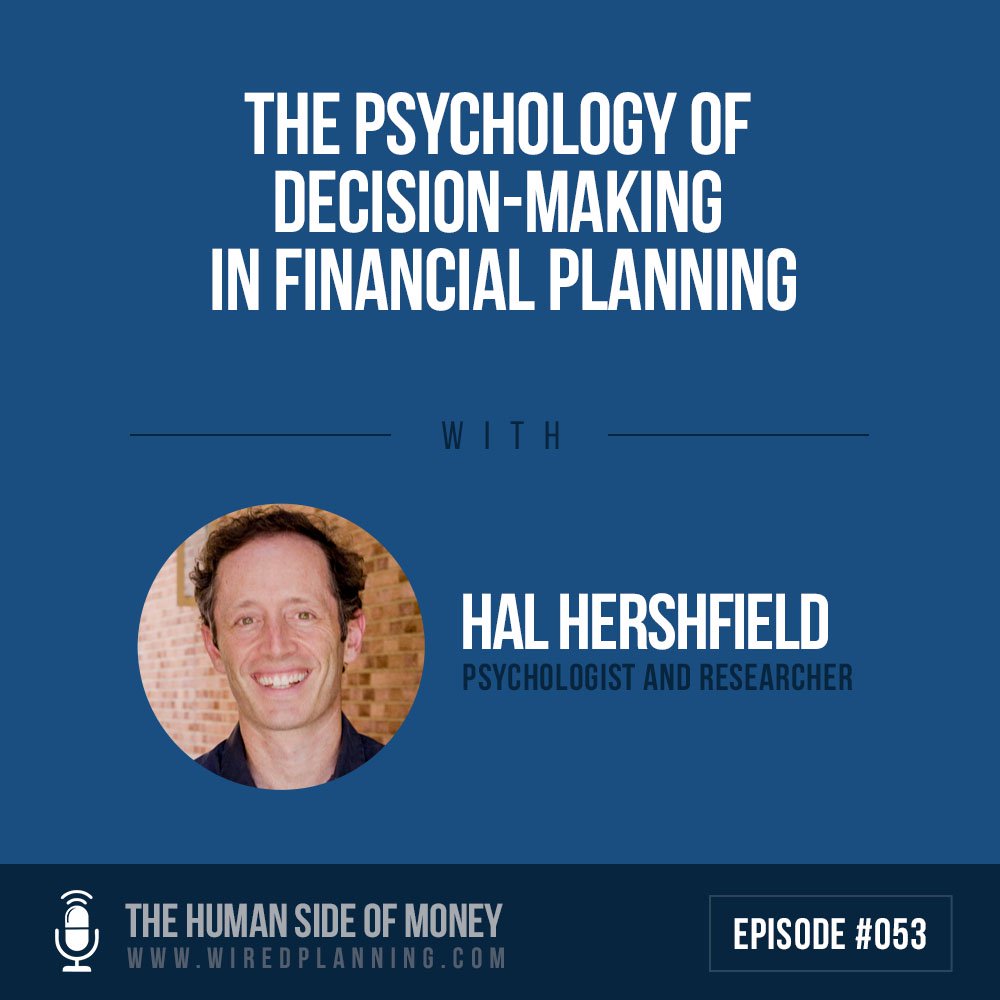Show Links
*If you want to be notified when the next episode packed full of practical tips and strategies to master the human side of money will be released, you can:
- Subscribe to the Show
- Join the community of like-minded advisors and planners across the world being notified via email. In addition to podcast releases, you’ll get our monthly “Wisdom Round Up” where we deliver to you the best content from around the industry on applying behavioral finance and mastering the human side of money.
Episode Summary
There are numerous psychological factors that influence financial decision-making.
One of the most prominent is also the most storied rivalry in finance.
The current self versus the future self.
Here’s a classic example: “Do I spend my $5,000 bonus and take my wife on a dream vacation or do I save and invest it for a trip in 20 years?”
Your current self’s response: “This is a no-brainer! You clearly take your wife on a dream vacation and enjoy the moment now. Your future self in 20 years will be able to take care of himself. Plus, what happens if you don’t even live another 20 years??”
Your future self’s response: “In 20 years, you’re going to be tired of working every day and would love to have enough money to be financially independent and no longer slaving away. I’m sitting here with your self in 20 years and you won’t stop telling me how badly you wish you would have saved more money when you had the chance!”
As you know, and as research confirms, the current self often emerges victorious in this rivalry.
Yet, the very nature of financial planning is focused on planning, protecting, saving and investing for the future.
It helps to explain what happened when you met with a client the year after they received their perfectly-crafted financial plan only to realize they haven’t started putting money in their IRA or the 529’s you set up…
They knew what to do. But there was a reason they didn’t do it.
It’s oftentimes the gap between the current and future self that prevents follow-through.
In fact, the research shows most people are disconnected from their future selves, seeing them as the equivalent of a stranger and leading to decisions that satisfy the current self.
Another study from Morningstar found that a client’s mental time horizon (how far out they plan in the future) has a greater impact on their savings behavior than their age, income, and education.
It’s as simple as this:
Our behavior in the present is largely shaped by our view of the future. If our view of the future is clear, exciting, and something we believe we can create, then our behavior in the present will reflect that.
Helping clients bridge the gap between their current and future selves by creating a vivid, exciting and hopeful future will result in higher follow-through on our advice, and ultimately, better outcomes for clients.
Fortunately, Dr. Hal Hershfield is the foremost authority on the topic. His award-winning research on the current versus future self has been featured in top academic journals, and he joined us to explain the battle between the current and future self, the challenges, and what we can do about it.
Things You’ll Learn
- The one study he was a part of that he was surprised never took off
- The connection between our current selves and future selves in financial decision making
- Why it’s so hard to make decisions for our future selves and what to do about it
- Whether we should expect that most clients prioritize the current self over the future self
- The unexpected pitfalls of focusing too heavily on the future self
- The question to ask your clients who don’t spend the way they could be
- How the way you present information to clients actually persuades their decision making
- The “Illusion of Wealth” and how it effects retirement and social security claiming decisions
About Hal Hershfield
Hal Hershfield is a Professor of Marketing, Behavioral Decision Making, and Psychology at UCLA’s Anderson School of Management. He summarizes his work this way: “How can we help move people from who they are now to who they’ll be in the future in a way that maximizes well-being?”
His research concentrates on the psychology of long-term decision-making and how time affects people’s lives. One of his most well-known discoveries suggests that when people are confronted with their “future selves”, they experience an emotional sense of connection that can influence long-term financial decision making.
He publishes in top academic journals, consults with financial services firms and marketing agencies, and was named one of “The 40 Most Outstanding B-School Profs Under 40 In The World” by business education website Poets & Quants.
Other Episodes You’ll Like On Psychology and Decision Making in Financial Planning
- Episode 10: Improving Client Behavior by Bridging the Gap Between Current and Future Self with Meghaan Lurtz
- Episode 24: Improving Client Decisions and Behavior Through Brain Science with Graeme Newell
- Episode 18: Understanding a Client’s Money Mindset in Order to Maximize Their Well-Being with Dr. Sarah Newcomb
Resources
Hal Hershfield – UCLA Anderson School of Management
To Sell Is Human: The Surprising Truth About Moving Others by Daniel Pink
My Struggle by Karl Ove Knausgaard
Whenever you’re ready, there are 3 ways I can help you master the human side of advice:
- HSOA Masterclass: An 8-week group program on building trust & connection, aligning money and life, and delivering frictionless advice.
- The Ultimate Discovery Meeting: A proven framework to seamlessly convert prospects into life-long clients in one meeting.
- HSOA Community (COMING SOON!): An online space to meet, collaborate, discuss, brainstorm, learn and grow with other advisors passionate about the human side of advice
If you’re interested, let me know here.





